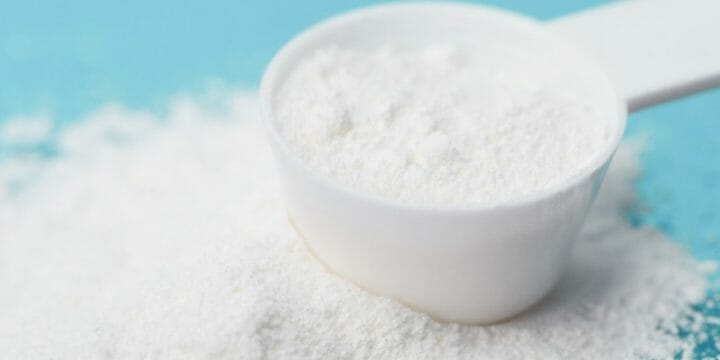The ketogenic diet claims that it can help boost athletic performance and help with weight loss.
But, to achieve this, you need to go into a state of ketosis — the body burns fat for fuel, not sugar.
The big question is, how do multivitamins and supplements affect the state of ketosis? As a fitness coach with experience, I spent hours researching and consulting our resident dietitian, and here's what we found.
Quick Summary
- Most multivitamins you purchase in pills are pure compounds and won't affect your keto diet.
- The best multivitamins for a keto diet are magnesium, omega-3 fatty acids, and vitamin D.
- Around 57% of Americans are magnesium-deficient, a concern for those on keto diets since high-carb foods are common magnesium sources.
- In my experience, carefully selected multivitamins have supported my health without compromising my ketosis.
Do Multivitamins Affect Ketosis?

Yes, multivitamins can affect ketosis. But the effect is not as straightforward as it sounds.
To be clear, no, you don’t have to stop taking them. It’s safe to take multivitamins when on a keto diet, and they can even help reduce the effects of the keto flu.
You don’t have to worry about multivitamins having too many net carbs and kicking you out of ketosis. Most essential vitamins and minerals you purchase in pill form are pure compounds and won’t disrupt ketosis.
“A good multivitamin will make sure you’re covering all of your bases.”
- Whitney English, RD
The issue lies in supplements with fillers, like excess carbs. Pills may contain simple sugars like dextrin and maltodextrin. Flavored drink supplements, gummies, and protein powders can also add sugars and carbs.
However, the carb intake from your multivitamin is typically insufficient to break your fast or affect ketosis, as most supplements contain only small amounts of carbs.
How to Choose a Multivitamins for a Keto Diet?

A well-chosen multivitamin boosts health and energy, potentially shielding against issues like heart disease and cancer, while aiding fat loss, as per Nature [1].
However, not all multivitamins are equal. Some contain ineffective or risky ingredients that disrupt metabolism, increase hunger, and hinder keto efficiency. For instance, inadequate forms of vitamins C, K2, and magnesium are used, replaced by risky elements like iron and folic acid.
For a healthy keto lifestyle, whole and unprocessed foods are the key. They will give you all the vital nutrients and correct fat intake.
Correcting these issues improves the likelihood of achieving and maintaining a healthy body weight. Despite efforts to obtain nutrients from food alone, essential ingredients in your multivitamins are crucial.
Magnesium

Magnesium is a mineral that boosts energy, supports the immune system, and regulates blood sugar levels. It’s also important for nerve and muscle function.
So, for example, if you have muscle cramps, it may be a sign that you need a magnesium supplement, and you should supplement with magnesium citrate. It’s estimated that 57% of Americans have a magnesium deficiency [2].
Meeting magnesium needs on a ketogenic diet is tough. Magnesium-rich foods like beans and fruits are high in carbs. Beyond regulating blood sugar and boosting energy, magnesium supports the immune system. On keto, aim for 500 mg of magnesium daily.
You can intake it through low carb vegetables, such as:
- Leafy green vegetables non-starchy vegetables— such as spinach
- Pumpkin seeds
- Avocado
- Nuts
Omega 3 Fatty Acids

Omega 3 fatty acid is an essential fatty acid most commonly found in cold-water fish, such as salmon, tuna, and herring. It helps regulate inflammation and support cognitive health.
If fish isn't a regular part of your diet, opt for a fish oil or flaxseed oil supplement as an Omega-3 substitute. Choose a reputable brand that undergoes third-party testing for purity and potency.
Pro tip: Be careful when shopping for fish oils, as the FDA doesn’t regulate most. Make sure the brand is trustworthy and that the smell isn’t rotten.
Vitamin D

One study from the National Library of Medicine claims that 50% of the world’s population has Vitamin D deficiency [3]. This can lead to:
- Heart disease
- Autoimmunity
- Cancer
- Diabetes
A ketogenic diet won’t necessarily put you into a Vitamin D deficiency, but because Vitamin D deficiency is so common, chances are you won’t hurt from Vitamin D supplementation.
I was shocked to discover my lab results showed low Vitamin D levels, placing me in the 50% globally lacking this nutrient. Despite religiously following my keto diet, I learned low Vitamin D can lead to issues like heart problems and autoimmune conditions.
Take it in the morning, and not evening, so it doesn’t affect your sleep.
Related article: 10 Foods That Knock You Out of Ketosis
Ketogenic Diet Multivitamins Side Effects

While covering bases with a multivitamin may seem logical, synthetic nutrients lack the natural balance found in whole foods. Consider potential side effects, as some may experience digestive discomfort or allergies with supplements.
Excessive vitamin intake can lead to toxicity and adverse effects. Following recommended dosages and consulting healthcare professionals before starting supplements is crucial.
Issues with dietary supplements include ineffective forms and dangerous amounts. For instance, exogenous ketones are less effective than natural ketosis, especially for fat metabolism. Digestive enzymes can interfere with fat burning, fluid balance, and raise blood pressure.
Opt for a balanced diet rich in healthy fats. Pay attention to sodium intake for stable blood pressure and to prevent keto flu.
Keto related articles:
FAQ
Can I Take Vitamins & Supplements on Keto?
Yes, you can take vitamins and supplements on a keto diet. It's essential to choose those that do not contain added sugars or carbs that could interrupt ketosis.
Do Multivitamin Have Carbs?
Yes, some multivitamins may contain carbs, mainly if they include fillers like dextrin or maltodextrin. Always check the label to ensure your multivitamin is low in carbs and keto-friendly.
References:
- https://www.nature.com/articles/nrendo.2016.54
- https://pubmed.ncbi.nlm.nih.gov/20142823/
- https://www.ncbi.nlm.nih.gov/books/NBK532266/
About The Author
You May Also Like






